| |
27 November 2006 |
Never Say McClory Again!
|
|
|
GRAHAM RYE takes a look at the life and times of Kevin McClory (1926-2006) To the general reader
the name Kevin McClory, who died aged 80 on November 20th, will strike no
chord, but to most devotees of James Bond history the name will be forever
associated with the Ian Fleming novel, film and THUNDERBALL trial - and
his myriad aborted attempts countered by countless litigation to launch an
alternative James Bond film franchise from highly questionable rights! |
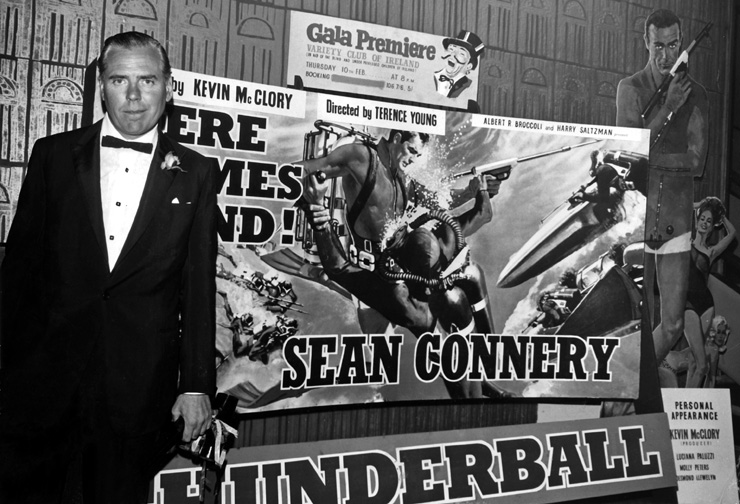 |
|
ABOVE: Kevin McClory at the Dublin premiere of Thunderball
(1965) held at the Savoy cinema on February 10, 1966. |
|
|
|
Born in Dublin on June
8th 1926, Kevin O’Donovan McClory was a descendent of the Bronte sisters,
by his grandmother Alice McClory. His parents were both actors on the
Irish stage, which fired his early desire to become an actor, but this
ambition was hampered by severe dyslexia at school, and was finally
blocked by a nervous stammer that was caused by a traumatic incident in
World War II; in 1943 when serving in the Merchant Navy McClory’s ship was
torpedoed while in the North Atlantic. He drifted over 700 miles in a
lifeboat in freezing conditions with other crew members for 14 days,
before being picked up off the coast of Ireland as one of the few
remaining survivors.
In 1946, his desire still strong to be in showbusiness and now with a
greater appreciation of life, McClory talked his way into £4-a-week job as
a boom operator and directors’ ‘tea boy’ at Shepperton Studios. With a
burning ambition to be noticed McClory worked in various capacities on
classic British films including Anna Karenina (1948) and The
Cockleshell Heroes (1955). It was during this early period at
Shepperton that he formed a life-long friendship with director John
Huston, another larger-than-life Irishman. McClory would eventually become
Huston’s assistant on pictures like The African Queen (1951) and
Moulin Rouge (1952), before graduating to Assistant Director on
Huston’s version of the Herman Melville classic Moby Dick (1956)
starring Gregory Peck. This proved McClory’s stepping stone to become
jack-of-all trades on the mammoth production Around The World In 80
Days (1956), with him acting as producer Mike Todd’s assistant,
Assistant Producer, and Assistant Director. |
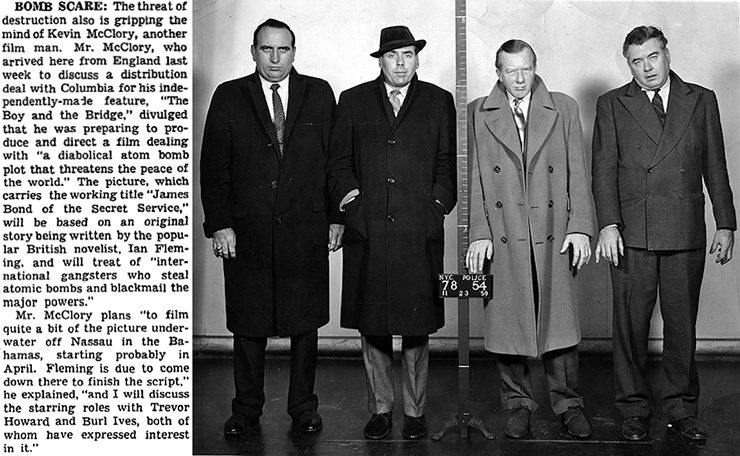 |
|
ABOVE: (left) New York Times report from November 15, 1959
announcing the production of ‘James Bond of the Secret Service’
co-authored with Ian Fleming. (right) A week later whilst still in
New York, Kevin McClory playfully arranged to have his friends
arrested, and they posed for a joke photograph. Pictured above
[L-R] are Lieutenant Kelly of the New York police, McClory,
screenwriter Jack Whittingham, and production manager & producer
Leigh Aman. |
|
|
|
McClory wanted more control over his own creative destiny and decided to
write, produce and direct The Boy And The Bridge (1959). Blarney
continued to baffle brains when McClory met wealthy Englishman Ivar Bryce
in The Bahamas. Bryce formed Xanadu Productions with McClory to finance
his first solo production. Bryce was a very close friend of James Bond
author Ian Fleming, and it wasn’t long before, at Bryce’s suggestion, that
McClory read several of Fleming’s novels with a view to filming one of
them. The young super enthusiastic Irishman soon realised that these books
had great potential. And great earning potential! However, McClory thought
very much in visual terms, a hangover from his childhood dyslexia, and
believed that he, Fleming and Bryce should collaborate on an original more
cinematic screenplay. To this triumvirate on behalf of Xanadu Productions
he introduced Jack Whittingham, then ranked among the Top 10 screenwriters
in the UK, whose work had been received with great critical and public
acclaim in Ealing Studios films including Mandy (1952) and The
Divided Heart (1954), who wrote a first draft screenplay that
eventually Ian Fleming would title Thunderball. The Bondwagon was
about to start rolling, the big bucks and the fame were only a stone’s
throw away, or so McClory believed. Unfortunately for him, The Boy And
The Bridge performed very badly at the world box-office and sank
without a trace. Bryce and Fleming’s initial enthusiasm for the young
Irishman handling the production of their first James Bond film project
suddenly faded. Expecting the profits from The Boy And The Bridge
to part-finance the Thunderball film both Bryce and Fleming got
cold feet and walked away from the project leaving McClory high and dry.
Neither men had been particularly up front in their dealings with McClory,
and it was only a matter of time before the Force Majeure would hit the
fan! |
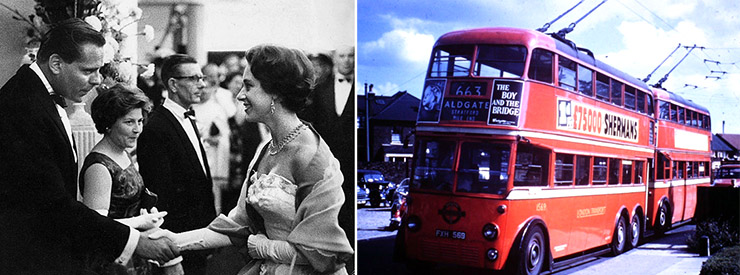 |
|
ABOVE: (left) Kevin
McClory is presented to HRH Princess Margaret at the Royal
Premiere of The Boy And The Bridge held at the Curzon
cinema on Shaftesbury Avenue in London's West End on Wednesday
July 22, 1959. (right) A London Trolleybus displaying double-crown
posters advertising The Boy And The Bridge (1959) which
played at the Curzon cinema until Thursday August 20, 1959. The
Boy And The Bridge was chosen as the UK entry at the 1959
Venice Film Festival (August 23 – September 6, 1959) where it was
nominated for the Golden Lion award as Best Film. |
|
|
|
When Ian Fleming sat at his typewriter at his Jamaican home ‘Goldeneye’ in
January 1961 to write his ninth Bond novel he was in ill-health with heart
trouble and felt very much a spent force. Writing to William Plomer, an
old friend from his days with Naval Intelligence, who always proof-read
and pre-edited his Bond novels, Fleming complained that he was,
“Terribly stuck with James Bond. What was easy at 40 is very difficult at
50. I used to believe – sufficiently – in Bonds and blondes and bombs. Now
the keys creak as I type and I fear the zest may have gone. Part of the
trouble is having a wife and child. They knock the ruthlessness out of
one. I shall definitely kill off Bond with my next book – better a poor
bang than a rich whimper!” Perhaps it was no surprise then that a
tired writer would turn to a convenient formed idea. Why let it go to
waste? So Fleming based his ninth novel THUNDERBALL on the collaborative
screenplay without any idea of including any credit for McClory’s input
and Whittingham’s screen treatment. It would prove to be a costly error in
judgement. Or was it the act of a man who knew his life was coming to a
close and didn’t care? Or just arrogance? |
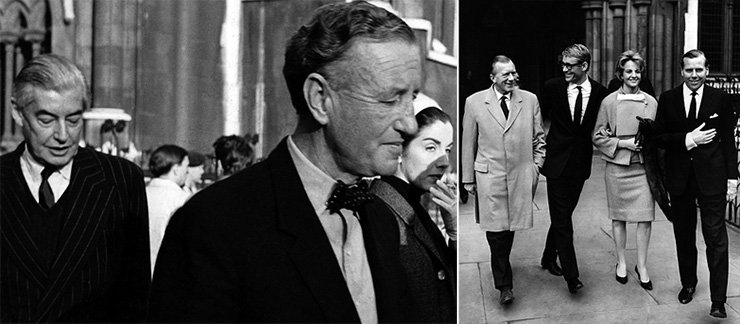 |
|
ABOVE (left) A
humiliated Ian Fleming leaves the High Court followed by his
friend and co-defendant Ivar Bryce. (right) A victorious Kevin
McClory leaves the High Court accompanied by his wife “Bobo” Sigrist, Jack Whittingham, and screen actor and friend Peter
O'Toole. |
|
|
|
Prior to the publication of THUNDERBALL on March 27th 1961 in London by
Jonathan Cape, Kevin McClory obtained an advance proof copy of the novel.
As soon as he realised that Fleming had plagiarised their collaborative
screenplay he sent a warning letter to the publishers that if they
published the book as it stood he would take legal action. Receiving no
answer from publishers Jonathan Cape, McClory sued. McClory was out to
stop Jonathan Cape from publishing THUNDERBALL representing it as the sole
work of Fleming. At a hearing a judge decided that since the accused had
insufficient time to mount a defence and publication of THUNDERBALL was
already so well advanced it couldn’t be stopped, McClory and Whittingham’s
application was refused. A little over two weeks after the failed book
injunction, Ian Fleming suffered a major heart attack during the regular
Tuesday morning conference at The Sunday Times. He was rushed to
The London Clinic where he remained for a month.
The ensuing case that began on November 20th 1963 at the High Court in
London was heavily covered in the media. Newspaper headlines screamed
‘JAMES BOND IN A ‘THUNDERBALL’ CLASH!’ Jack Whittingham found it necessary
to withdraw as co-plaintiff due to escalating costs, but, although in
extreme ill-health, returned every day to loyally support McClory, who
ultimately would do nothing to help Whittingham meet his crippling court
costs. After nine days in court both Ivar Bryce and Ian Fleming decided to
settle. McClory’s settlement demand? £55,000.
In the final outcome Kevin McClory was awarded £35,000 and his court costs
paid (totalling £52,000), plus the film and TV rights to all the existing
Thunderball screen treatments. However, even though he had won the
case he was unhappy with the financial result and never paid his lawyer’s
costs.
Ian Fleming had two further serious heart attacks during the trial. Until
on August 12th 1964, nine months after the THUNDERBALL trial he suffered a
final fatal heart attack aged 56 and died in the Kent & Canterbury
Hospital. |
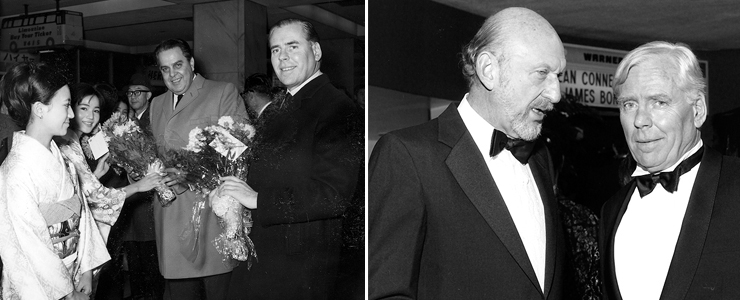 |
|
ABOVE: (left)
Thunderball executive producer Albert R. Broccoli arrives at
Tokyo airport with Kevin McClory ahead of the world premiere of
the 4th James Bond film which was held at the Hibiya Theatre on
December 9, 1965. (right) Never Say Never Again (1983)
director Irvin Kershner with Kevin McClory at the
UK Royal Charity Premiere
held at the Warner West End cinema, London on December 14, 1983. |
|
|
|
THUNDERBALL was eventually made into a film in 1965 by producers Albert R.
‘Cubby’ Broccoli & Harry Saltzman, who ‘presented’ the film for their
company EON Productions. Kevin McClory was credited as producer on the
film and, ‘Based on an original story by Kevin McClory, Jack Whittingham &
Ian Fleming’. The film grossed $141.2 million worldwide.
Jack Whittingham died of a heart attack aged 62 in Malta in 1973, his
contribution to the cinematic legacy of James Bond all but forgotten and
unrecognised.
In 1983 Kevin McClory acted as Executive Producer on
Never Say Never
Again, a remake of Thunderball. Sean Connery returned after 12
years to star as James Bond. The film grossed £137.5 million (estimated)
worldwide.
One of Kevin McClory’s closest ‘friends’ during the late 50s and 60s was
Jeremy Vaughn, who also knew Ian Fleming well, as his neighbour in
Jamaica. Quoted in Robert Sellers soon-to-be-published book
The Battle For
Bond, he recalls: “Kevin was a smooth operator, an attractive character,
but not a particularly pleasant one, certainly compared to his brother,
Desmond, who was one of the kindest people you could ever meet. If a
friend was in trouble, Desmond would always be there. Kevin would just
tell you to piss off, if you weren’t any good to him. He’s been very cruel
to a number of people over the years who thought they were his friends.
The overdriving thing with Kevin was that he just wanted to be a
celebrity, he wanted to be famous, he wanted to be, look at me, I’m Kevin
McClory. He probably had some semi-professional technical interest in
making a film, but he really wanted the glamour. He wanted to be amongst
the people that he thought he should be amongst.” “It was Kevin’s burning
ambition these [Bond] movies, but I don’t think he gave a damn who he
walked over and what he did in order to get there. Kevin had a project in
life and that project was Kevin McClory. Whether it was women, or money,
or making movies, or whatever, if that’s what I have to do for the Kevin
McClory project. Everything had a purpose.”
Kevin McClory was a rogue, but nevertheless a charming one, apparently. |
|
 |
JAMES BOND NEWS |
Thunderball FACT FILE |
 |

